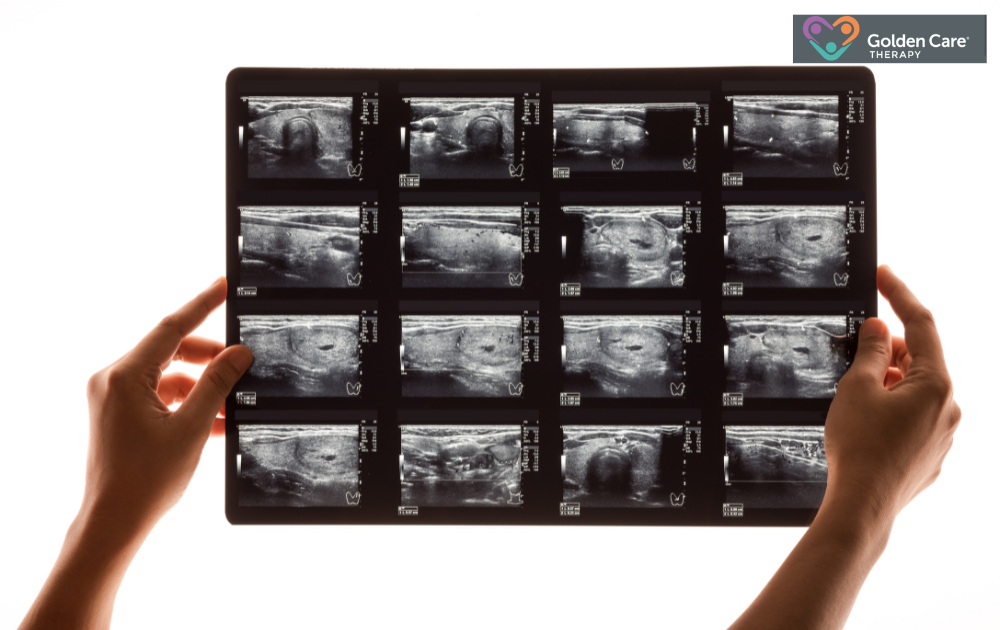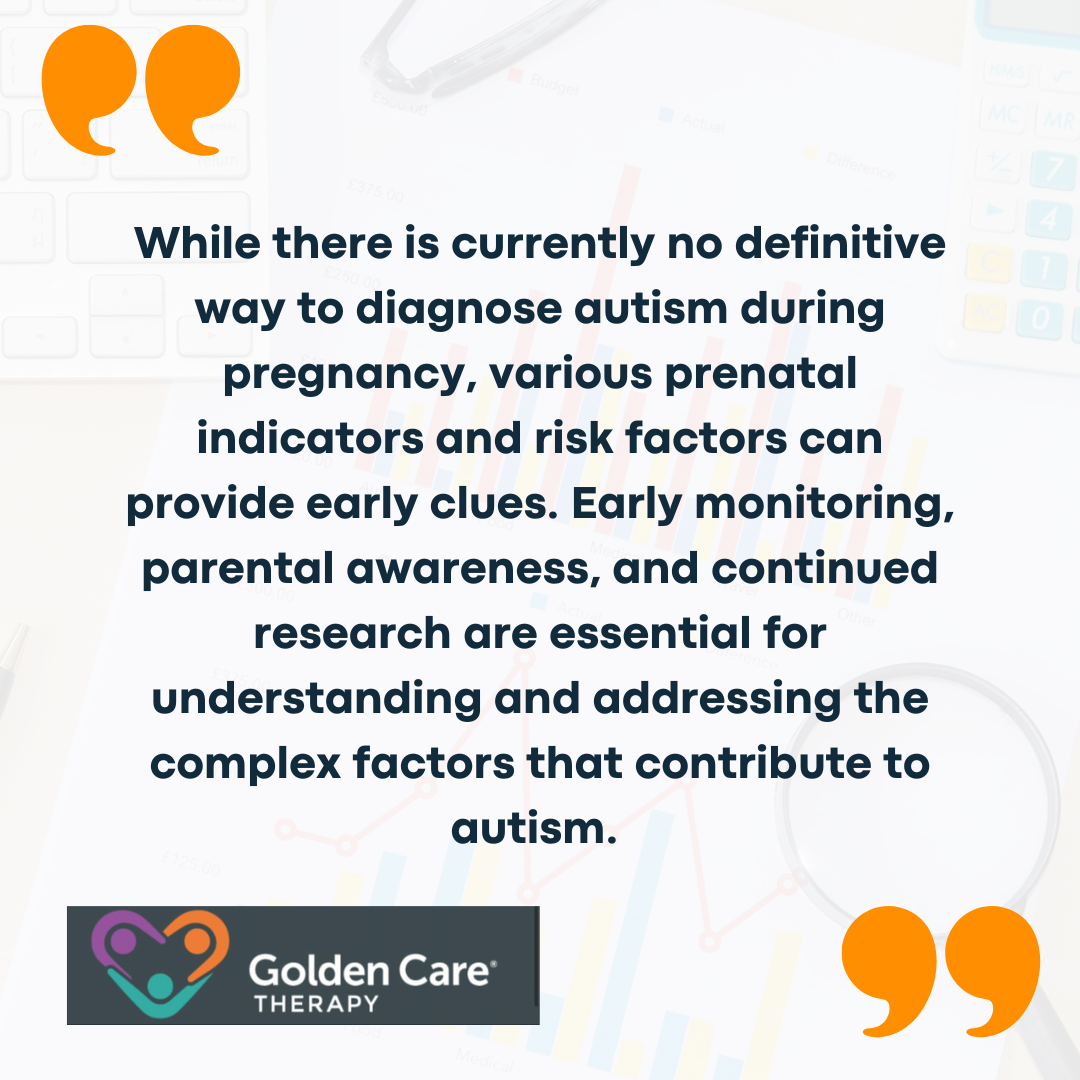The exact causes of autism are still elusive, but according to research, it could be a combination of environmental and genetic factors. However, a question that often arises is whether signs of autism can be detected during pregnancy. While there is no definitive prenatal test for autism, certain indicators and risk factors can provide early clues.

Prenatal Indicators of Autism
Unfortunately, autism can’t be diagnosed during pregnancy, but several prenatal factors can increase the likelihood of a child being diagnosed with autism later in life. These factors are typically identified through detailed medical histories, advanced imaging techniques, and maternal health assessments.
Understanding these indicators can help expectant parents and healthcare providers monitor potential developmental concerns early on.
Maternal Health and Environmental Exposures
The health of the mother and her environment play a crucial role in fetal development. Research has shown that maternal health conditions such as gestational diabetes, obesity, and autoimmune disorders can increase the risk of autism in offspring.
Additionally, environmental exposures to pollutants, pesticides, and certain medications during pregnancy have been linked to higher autism risk. For example, exposure to high levels of air pollution has been associated with an increased likelihood of autism, particularly when the exposure occurs during critical periods of brain development.
Genetic Factors
Genetic predisposition is a significant factor in the development of autism. Families with a history of autism or other neurodevelopmental disorders may have a higher risk of having a child with autism. Advances in genetic testing and prenatal screening can identify specific genetic mutations or chromosomal abnormalities that are associated with autism.
For instance, conditions like Fragile X syndrome and Rett syndrome, which have known genetic links to autism, can be detected through prenatal genetic testing.

Fetal Brain Development
The development of the fetal brain is a critical period during which many aspects of neurological function are established. Advanced imaging techniques such as fetal MRI can provide insights into brain development anomalies that may be associated with autism.
Studies have identified differences in brain structures, such as the amygdala and cerebellum, in fetuses that later develop autism. These differences can sometimes be detected through detailed imaging studies, although they are not definitive indicators of autism.
Abnormal Ultrasound Findings
Routine prenatal ultrasounds can sometimes reveal subtle anomalies that might be associated with an increased risk of autism. For example, differences in head size (macrocephaly or microcephaly) and irregularities in brain structure have been observed in some studies.
These findings are not conclusive but can prompt further investigation and monitoring. It is important to note that these anomalies are not exclusive to autism and can be associated with various other conditions.
Maternal Immune Response
The immune response of the mother during pregnancy can influence fetal brain development. Infections, inflammation, and autoimmune conditions in the mother have been linked to an increased risk of autism in offspring.
For example, maternal infections such as rubella and cytomegalovirus, as well as chronic inflammation conditions like rheumatoid arthritis, have been associated with higher autism risk. The mechanisms are not fully understood, but it is believed that maternal immune activation can impact neurodevelopmental processes.

The Role of Advanced Imaging and Screening
Advances in prenatal imaging and screening have enhanced our ability to monitor fetal development and identify potential risk factors for autism. Techniques such as fetal MRI and detailed ultrasound imaging provide valuable information about brain structure and function.
Additionally, non-invasive prenatal testing (NIPT) and genetic screening can identify chromosomal abnormalities and genetic mutations associated with autism.
While these technologies offer valuable insights, they are not definitive diagnostic tools for autism and should be used in conjunction with other assessments and monitoring.
Fetal MRI
Fetal MRI is a powerful tool that provides detailed images of the developing fetal brain. Unlike traditional ultrasound, MRI can capture high-resolution images of brain structures, allowing for the identification of subtle anomalies.
Studies have used fetal MRI to examine brain development in fetuses at risk for autism, revealing differences in brain structures such as the corpus callosum and ventricles. While these findings are not diagnostic, they can provide early clues and guide further monitoring and intervention.
Non-Invasive Prenatal Testing (NIPT)
NIPT is a screening method that can detect chromosomal abnormalities and specific genetic mutations associated with autism. For example, NIPT can identify conditions like Fragile X syndrome and Down syndrome, which have known links to autism. While NIPT is not a diagnostic test, it provides valuable information that can help expectant parents make informed decisions about further testing and monitoring.
Genetic Screening
Advances in genetic screening have made it possible to identify specific genetic mutations associated with autism. Prenatal genetic testing can detect conditions like Fragile X syndrome, Rett syndrome, and other genetic disorders linked to autism. These tests involve analyzing fetal DNA obtained through amniocentesis or chorionic villus sampling (CVS).
While genetic screening provides important information, it is important to understand that autism is a complex condition with multiple contributing factors, and genetic mutations alone do not determine the development of autism.

Understanding the Complexity of Autism Risk Factors
Autism is a multifaceted condition with a wide range of contributing factors. Understanding the potential signs and risk factors during pregnancy requires a comprehensive approach that considers genetic, environmental, and maternal health factors.
While prenatal indicators can provide valuable insights, it is important to recognize that they are not definitive diagnostic tools. Early monitoring and intervention can make a significant difference in the developmental outcomes of children at risk for autism.
Early Monitoring and Intervention
Early monitoring and intervention are crucial for children at risk for autism. Prenatal indicators and risk factors can guide healthcare providers in identifying children who may benefit from early assessments and interventions. Early intervention programs, such as speech therapy, occupational therapy, and behavioral therapy, can support the development of children with autism and improve their quality of life.
Research has shown that early intervention can lead to significant improvements in communication, social skills, and adaptive behavior.
Parental Awareness and Support
Parental awareness and support play a vital role in the early identification and intervention of children at risk for autism. Expectant parents should be informed about the potential risk factors and indicators of autism during pregnancy. Healthcare providers can offer guidance and support, helping parents navigate the complexities of prenatal screening and monitoring.
Additionally, support groups and resources for parents of children with autism can provide valuable information and a sense of community.
The Importance of Continued Research
Continued research is essential for understanding the complex interplay of factors that contribute to autism. Advances in prenatal imaging, genetic testing, and environmental studies provide valuable insights into the early indicators and risk factors for autism. Ongoing research efforts aim to refine our understanding of these factors and improve early detection and intervention strategies.
Collaborative research involving geneticists, neurologists, and developmental psychologists is critical for advancing our knowledge of autism and improving outcomes for individuals and families affected by the condition.
Genetic Research
Genetic research continues to uncover new insights into the hereditary factors associated with autism. Studies investigating the role of specific genetic mutations, chromosomal abnormalities, and epigenetic modifications are expanding our understanding of the genetic basis of autism.
Collaborative efforts such as the Autism Sequencing Consortium (ASC) are working to identify genetic variants associated with autism and their functional implications. This research is crucial for developing targeted interventions and personalized approaches to support individuals with autism.
Environmental Studies
Environmental studies examine the impact of various factors, such as pollutants, medications, and maternal health conditions, on the risk of autism. Longitudinal studies tracking environmental exposures during pregnancy and their impact on neurodevelopmental outcomes are providing valuable data.
Research initiatives like the Environmental Influences on Child Health Outcomes (ECHO) program are investigating the role of environmental factors in autism and other developmental disorders. Understanding these influences is critical for developing preventive strategies and mitigating risk factors.
Advancements in Imaging Techniques
Advancements in imaging techniques, such as fetal MRI and advanced ultrasound, are enhancing our ability to monitor fetal brain development. These technologies provide detailed images of brain structures and function, allowing for the identification of subtle anomalies associated with autism.
Research using these techniques aims to refine our understanding of the early neurodevelopmental changes that contribute to autism. Continued improvements in imaging technology will further enhance our ability to detect and monitor these changes.

By staying informed and seeking early intervention, expectant parents and healthcare providers can support the developmental needs of children at risk for autism and improve their long-term outcomes. For top-rated ABA therapy in New Jersey, Indiana, Georgia, and New York, contact Golden Care Therapy today to book a consultation or learn more about our services.
Sources:
https://www.medicoexperts.com/signs-of-autism-during-pregnancy
https://www.babychakra.com/learn/how-to-detect-autism-during-pregnancy



